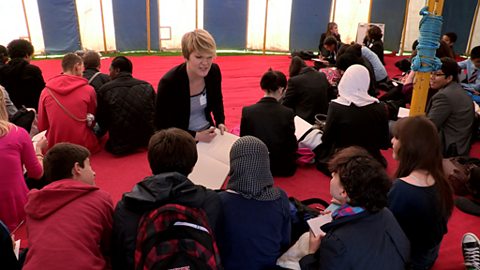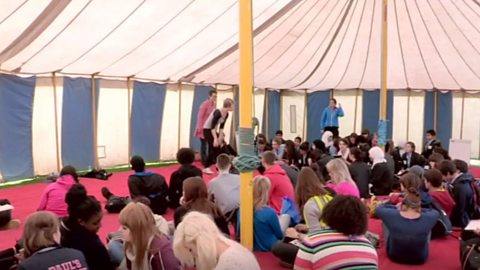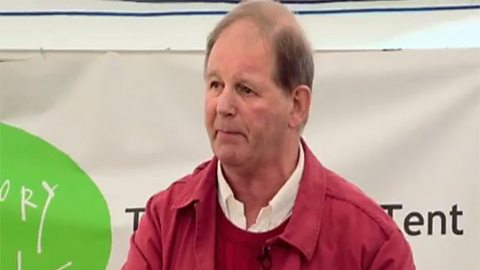PHILIP PULLMAN:I'm a novelist and that means that I have to write something long and continual, continuous.
PHILIP PULLMAN:And I have to do it every day.
PHILIP PULLMAN:I think poets work in a slightly different way. This may be why there's such a lot of First World War poetry but no First World War novels, you can't write a novel in the trenches.
PHILIP PULLMAN:Because you can't guarantee you're going to be there the next day never mind being able to finish chapter three or whatever it is.
PHILIP PULLMAN:Because writing a novel is not a sprint it's not something you do in a hurry. It's something you do over a long time, so if you get discouraged
PHILIP PULLMAN:when you're doing a long piece of work, don’t worry. Accept it, that’s part of the job.
PHILIP PULLMAN:That's part of what writing is this feeling of that you don’t know what to write next and your bored and your fed up and hate it wish you never began.
PHILIP PULLMAN:Good, you're doing the right thing. That's what it's like. I write about fantastical worlds because I'm lazy. I can't be bothered to go and do the research about the real world. It's much easier.
PHILIP PULLMAN:But less effort to sit at my desk and make it up. I never make a plan for a novel when I'm writing but I do look forward to bits that I'm, I'm going to write.
PHILIP PULLMAN:I do think well when those two characters meet up that will be good, I'll enjoy that bit. Put yourself into the scene what would you see if you were there?
PHILIP PULLMAN:And what is important about what you see if you were there? The story is always the governor.
PHILIP PULLMAN:In the book I'm holding here, The Amber Spyglass, which is the third part of His Dark Materials, there was a passage I was looking forward to writing.
PHILIP PULLMAN:It's a passage where two important characters meet for the first time. The two characters I'm talking about in this case were the boy Will and the bear lorek Byrnison. Now will is a boy from our world.
PHILIP PULLMAN:A very ordinary boy, there's nothing special about Will, he hasn’t got a special destiny or special powers or anything like that.
PHILIP PULLMAN:But he's discovered a weapon. A knife it's called the 'subtle knife'. A knife that can cut through anything.
PHILIP PULLMAN:Now, Will and the bear have never met. They've never come face to face. But this is when they do.
PHILIP PULLMAN:"Will put his rucksack down and hoisted the helmet up on its end. He could barely lift it. It consisted of a single sheet of iron dark and dented with eye holes on top and a massive chain underneath. It was as long as Will's forearm and as thick as his thumb.
PHILIP PULLMAN:'So this is your armour?' he said. 'Well it doesn’t look very strong to me!' 'I don’t know if I can trust it.' 'Let me see.'
PHILIP PULLMAN:He took the knife from the rucksack and rested the edge against the front of the helmet. Sliced off a corner as if he was cutting butter.
PHILIP PULLMAN:'That's what I thought' he said. He cut another and another, reducing the massive thing to a pile of fragments in less than a minute.
PHILIP PULLMAN:He stood up and held out a handful. 'That was your armour?' he said and dropped the pieces with a clatter on to the rest at his feet. 'And this is my knife. And since your helmet was no good to me I’ll have to fight without it. Are you ready, bear?
PHILIP PULLMAN:I think we’re well matched. I could take off your head with one blow of my knife, after all.'
PHILIP PULLMAN:Utter stillness. The bear’s black eyes glowed like pitch and Will felt a drop of sweat trickle down his spine. Then the bear’s head moved. He shook it and took a step backwards.
PHILIP PULLMAN:'Too strong a weapon' he said. 'I can’t fight that. Boy, you win.' Will knew that a second later the people would cheer and hoot and whistle so even before the bear had finished saying the word 'win' Will had begun to turn and call out, to keep them quiet 'Now you must keep the bargain. Look after the wounded people and start repairing the buildings. Then let the boat tie up and refuel.'
PHILIP PULLMAN:The bear spoke quietly in a voice that seemed to throb as deeply as the ships engines.
PHILIP PULLMAN:'What is your name?' he said. 'What do you seek?'
PHILIP PULLMAN:'I'm Will Parry, you're going up the river and I want to come with you.' 'I'm going to the mountains and this is the quickest way.' 'Will you take me?' 'Yes.'
PHILIP PULLMAN:'I want to see that knife?'
PHILIP PULLMAN:'I will only show it to a bear I can trust.' "There is one bear I've heard of who's trustworthy. He is the king of the bears, a good friend of the girl I'm going to the mountains to find.'
PHILIP PULLMAN:'Her name is Lyra Silvertongue. The bear is called lorek Byrnison.'
PHILIP PULLMAN:'I am lorek Byrnison' said the bear. 'I know you are' said Will."
PHILIP PULLMAN:Write whatever you like to read.
PHILIP PULLMAN:If you're interested in writing professionally don’t think of the market for one second. Publishers will always want to say, "Write something like the one that was the best seller last year we want another best seller.
PHILIP PULLMAN:Therefore you write one like the one that's gone before." I'd say exactly the opposite, write what only you think nobody else would be interested in but you.
PHILIP PULLMAN:But write that because that will be the thing that will come most deeply and truly out of you and the thing that will make the most impression on other people. Memory is very important, the memory of what we felt like at a particular age. Memory of what was the first, the first kiss you've ever had, the first time you ever…
PHILIP PULLMAN:heard a piece of music that later came to mean a great deal to you, things like this. Yeah if you keep those memories fresh your be able to draw on them.
Video summary
Philip Pullman reveals some secrets of the art and craft of fiction writing.
He stresses the importance of stamina and determination because “writing a novel is a marathon and not a sprint”.
He explains how a writer must learn to step inside a scene to imagine what is seen and heard, and how he prefers not to plan a book in advance, but instead look forward to writing about what happens as events unfold and characters cross each others' paths.
To illustrate this point he reads a tense passage from The Amber Spyglass.
This clip is from the series How to Write.
Teacher Notes
Could be used when discussing creative writing and story telling or when discussing the works of Philip Pullman. Useful when discussing fantastical worlds, realism, fantasy and science fiction.
This clip is relevant for teaching English Literature at KS3 in England, Wales and Northern Ireland, and 3rd and 4th Level in Scotland.
Poetry workshop about happiness. video
Caroline Bird invites young people to write a poem as a team.

Poetry workshop - The 2 sides of me. video
Caroline Bird invites thirty teenagers to imagine the two sides of their personalities and write poems about the differences.

Michael Morpurgo - writing tips. video
Authors and poets share the secrets of their writing.
